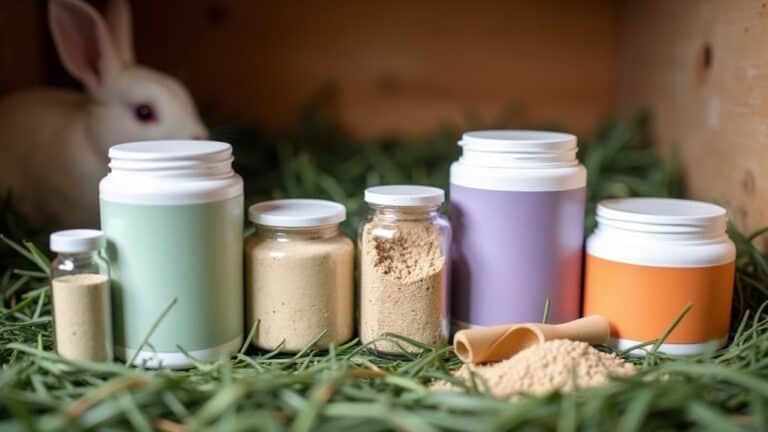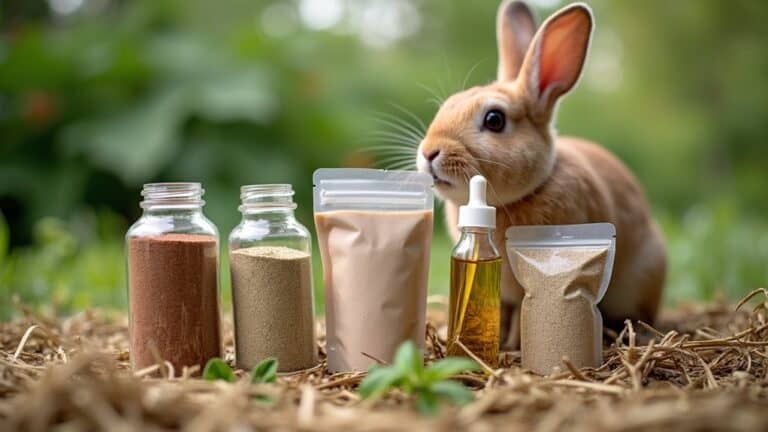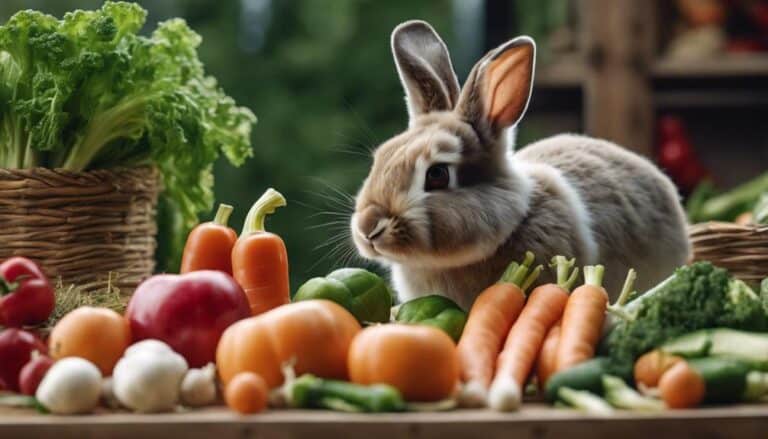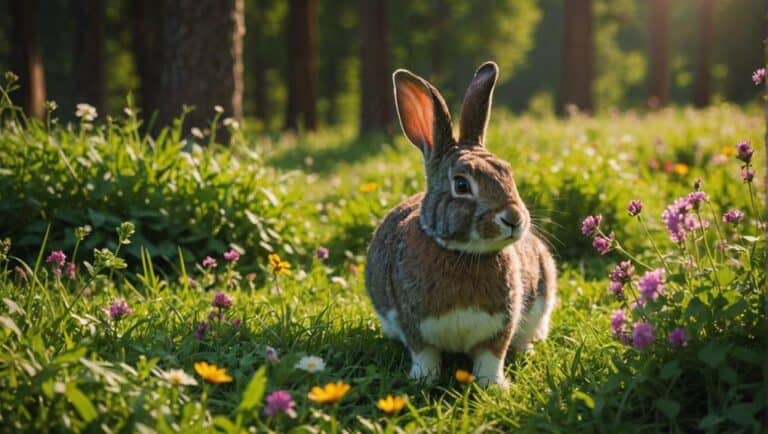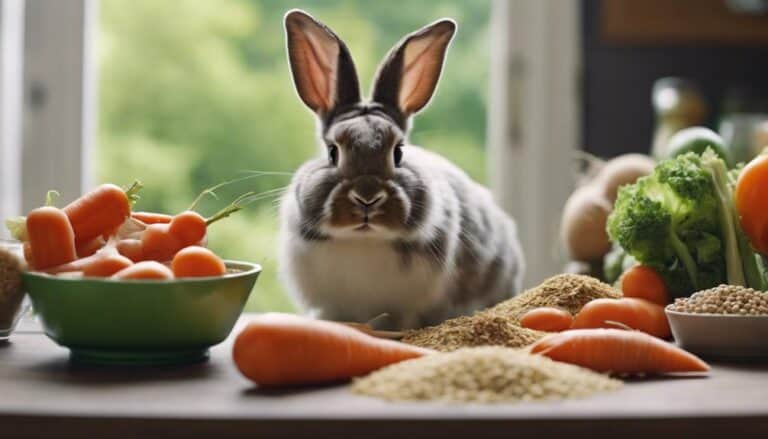Have you ever wondered if hay truly holds the sole answer to your bunny's well-being?
While hay undeniably plays a critical role in maintaining your rabbit's health, there may be other factors at play that influence their overall quality of life.
Exploring the interconnected aspects of a bunny's diet, exercise routine, and mental stimulation could shed light on the complete picture of what contributes to a happy and healthy bunny.
By considering these various elements, you might uncover a more holistic approach to ensuring your furry friend's vitality and contentment.
Contents
- 1 Key Takeaways
- 2 Importance of Hay in Bunny Diet
- 3 Types of Hay for Bunny Nutrition
- 4 Safety Measures for Feeding Hay
- 5 Quantity and Frequency of Hay
- 6 Hay Consumption for Different Bunny Ages
- 7 Maintaining Hay in Bunny Enclosures
- 8 Sourcing Affordable Hay for Bunnies
- 9 Introduction of New Hay Varieties
- 10 Frequently Asked Questions
- 11 What Vegetables Should I Feed My Bunny Besides Hay for a Healthy Diet?
- 12 Conclusion
Key Takeaways
- Hay is essential but not the sole factor in bunny health.
- Variety in hay types enriches nutritional intake and dietary experience.
- Proper hay storage and monitoring prevent digestive issues and obesity.
- Regular hay consumption supports digestive function, dental health, and overall well-being.
Importance of Hay in Bunny Diet
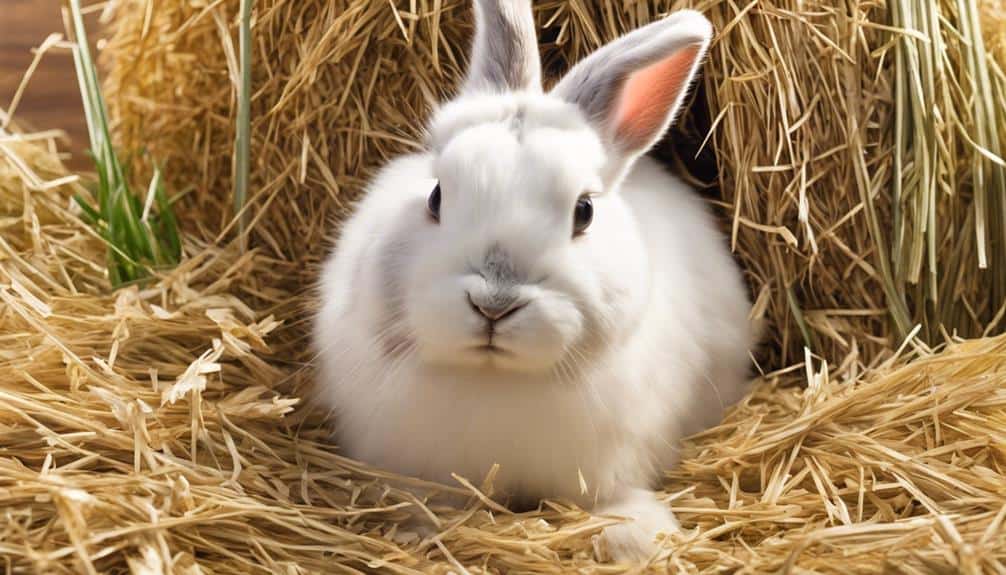
To guarantee excellent health and well-being for your bunny, hay plays a critical role in their diet by comprising 80% of their daily food intake. This aspect is important for maintaining a healthy diet for rabbits.
The high fiber content in hay is essential for the proper functioning of your bunny's digestive system. It helps in maintaining healthy cecocolic motility, preventing conditions like GI stasis. Additionally, hay aids in balancing cecal flora, promoting gut health, and contributing to your bunny's overall well-being.
By providing regular access to hay, you can prevent fur blockage, encourage natural foraging behavior, and support dental health through constant chewing. Including a variety of grass hays like timothy, orchard, and bluegrass in your bunny's diet is crucial for ensuring nutritional balance and dietary enrichment.
Incorporating hay into your bunny's diet isn't just about nutrition but also about maintaining their digestive health and overall quality of life.
Types of Hay for Bunny Nutrition
When considering the types of hay for your bunny's nutrition, understanding the unique benefits each variety offers is vital.
Timothy hay provides important dental health benefits for adult rabbits, while orchard grass hay promotes digestion and overall well-being.
Alfalfa hay is rich in protein and calcium, making it ideal for young and pregnant rabbits.
Hay Varieties for Bunnies
Have you ever wondered which types of hay are best for ensuring peak nutrition in your bunny's diet?
When it comes to hay varieties for bunnies, consider options like Timothy hay, ideal for adult rabbits due to its low calcium content and high fiber that supports dental health.
Orchard Grass hay is nutrient-rich, aids digestion, and offers a variety in taste and texture, keeping your bunny interested in mealtime.
For young and pregnant rabbits, Alfalfa hay is high in protein and calcium, promoting growth and development.
Meadow hay provides a mix of grasses, textures, and tastes, encouraging food consumption diversity.
Oat hay, with its crunchy texture and high fiber content, is suitable for underweight bunnies, adding a new dimension to their diet.
Benefits of Hay
Hay varieties play an important role in enhancing the nutritional intake of bunnies, contributing greatly to their overall health and well-being. Timothy Hay is essential for adult rabbits as it provides balanced nutrition and supports dental health.
While Alfalfa Hay, rich in protein and calcium, is suitable for young and pregnant rabbits, it should be limited for adults. Meadow Hay, a blend of grasses, offers varied textures and tastes, stimulating rabbits' interest in their diet.
Orchard Grass Hay is nutrient-rich, aiding digestion and promoting overall well-being in rabbits. By offering different types of hay, you can provide essential nutrients, encourage natural foraging behavior, and guarantee a balanced diet for your bunny's health.
Safety Measures for Feeding Hay
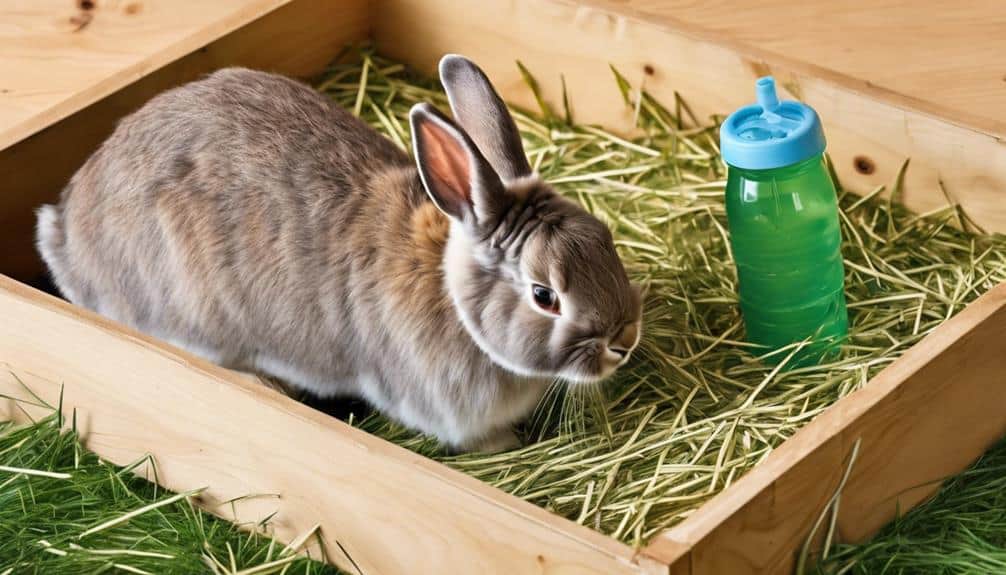
Guarantee the safety of your rabbits by following essential safety measures when feeding hay. Store hay properly to avoid mold and dust contamination. Check for quality to prevent digestive issues. Establish a feeding schedule to monitor intake and prevent obesity.
These measures are vital for maintaining peak health and well-being for your bunnies.
Hay Storage Tips
Properly storing hay is essential for maintaining its freshness and nutritional value, safeguarding the health of your bunnies. To achieve this, store hay in a cool, dry place away from direct sunlight to preserve its quality.
Ensure proper ventilation in the storage area to prevent mold growth and contamination. Opt for open containers or breathable bags for hay storage to allow air circulation and avoid moisture buildup, which can lead to spoilage.
Regularly inspect stored hay for any signs of mold, dust, or pests to guarantee its safety for consumption. Remember, proper hay storage is vital for maintaining hay quality and safeguarding your rabbits' health.
Hay Quality Checks
Maintaining the quality of hay for your bunnies involves conducting thorough checks for mold, dust, and pesticide residues before feeding to guarantee their safety and well-being. When inspecting hay, make sure it has a fresh, sweet smell and vibrant green color.
Avoid any hay that feels damp, musty, or shows discoloration, as these signs could indicate potential harm to your rabbit. Additionally, regularly examine the hay for foreign objects or contaminants that may pose a risk.
Prioritize organic, high-quality hay to provide best nutrition and safety for your bunny. By following these safety measures and selecting the best hay for your rabbits, you can contribute to their overall health and well-being.
Hay Feeding Schedule
Regularly monitoring your rabbit's hay intake is important to prevent obesity and make sure they receive the necessary nutrients for excellent health.
Maintain a constant supply of fresh hay to make certain they've access to essential fiber and nutrients throughout the day. Monitor their hay consumption to adjust quantities based on individual needs and activity levels. Rotate hay varieties to provide nutritional variety and prevent boredom while meeting dietary requirements.
Make sure the hay is clean, dry, and mold-free to avoid potential health issues like respiratory problems or digestive disturbances. Using hay racks or feeders can help minimize contamination and wastage, creating a hygienic feeding environment for your rabbits.
Quantity and Frequency of Hay
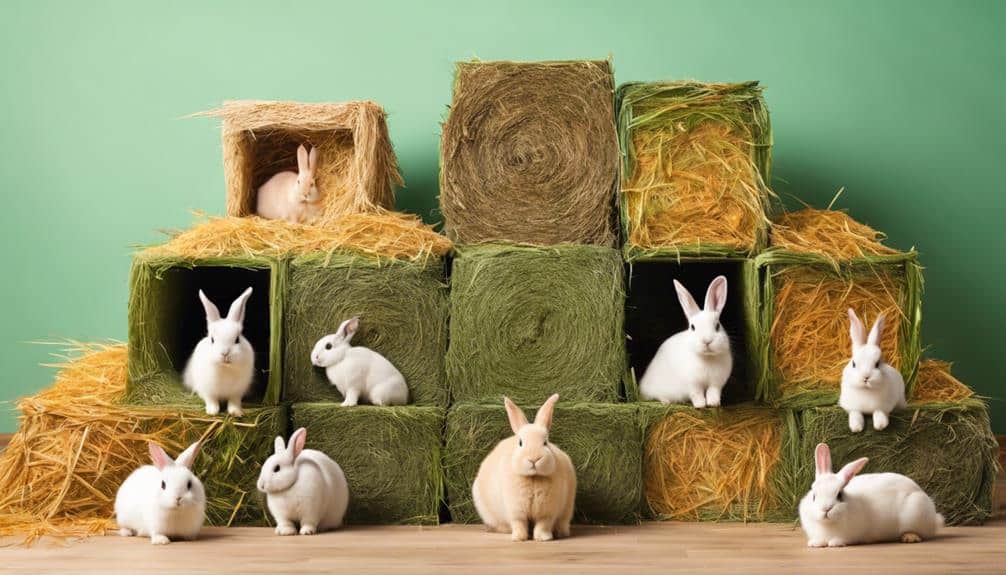
Hay quantity and frequency play a crucial role in guaranteeing excellent health for your bunny. To make sure your furry friend stays healthy and happy, consider the following guidelines:
- Unlimited Hay Access: Provide your rabbit with unrestricted hay access to promote digestive health and overall well-being.
- Variety of Hay Types: Offer a range of hay types such as timothy, orchard grass, and meadow hay to keep your rabbit interested and provide diverse nutritional benefits.
- Fresh Daily Hay: Make sure hay is provided fresh daily to maintain its quality, prevent spoilage, and offer clean and nutritious bedding for your rabbit.
Hay Consumption for Different Bunny Ages
When considering the appropriate hay consumption for bunnies of different ages, it's essential to tailor their diet to meet their specific nutritional needs. Baby bunnies shouldn't be introduced to hay until they're weaned to prevent potential digestive issues. Young bunnies benefit from the higher protein and calcium content found in alfalfa hay, aiding in their growth and development.
However, adult rabbits should limit or avoid alfalfa hay to prevent urinary issues associated with its high calcium levels. Providing a mix of timothy, oat, and grass hay is beneficial for bunnies of all ages, offering a balanced diet and preventing monotony.
It's crucial to consult a veterinarian to determine the ideal hay consumption based on your bunny's age and specific health requirements. By understanding the varying hay needs throughout a bunny's life stages, you can promote the best bunny health and well-being.
Maintaining Hay in Bunny Enclosures
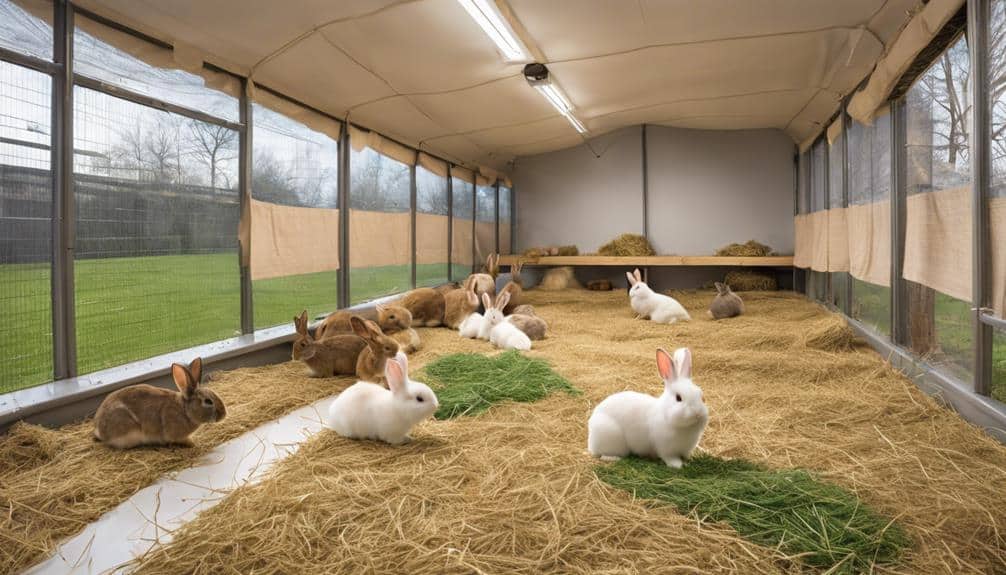
To maintain peak bunny health in enclosures, ensuring a constant supply of fresh hay is essential for promoting proper digestion and overall well-being. It's important to monitor hay consumption to prevent overeating or wastage, making sure your rabbits receive the necessary nutrition. Consider using hay racks or hay boxes to keep the hay off the ground, reducing contamination and maintaining cleanliness in the bunny enclosures. Additionally, replacing any soiled or wet hay promptly is important to prevent mold growth and sustain a hygienic living environment for your bunnies.
When it comes to providing hay for your bunnies, offering a variety of hay types such as timothy, orchard grass, or meadow hay can stimulate their interest and provide diverse nutrients essential for bunny health. By incorporating different hay types, you can guarantee your bunnies receive a balanced diet that supports their overall well-being. Maintaining hay in your bunny enclosures in a hygienic and organized manner is key to promoting their health and happiness.
Sourcing Affordable Hay for Bunnies
Considering the importance of maintaining hay in bunny enclosures for their health, sourcing affordable options becomes a practical aspect of responsible bunny care. When looking for cost-effective hay for your rabbits, start by exploring local farms or hay suppliers. These sources often offer competitive prices and fresher hay compared to commercial pet stores.
Another strategy is to join online rabbit communities or forums where members share recommendations on where to find affordable hay. Purchasing hay in bulk can also lead to significant cost savings over time, so consider buying larger quantities if storage space allows. Additionally, check with local feed stores or agricultural suppliers for budget-friendly hay options.
Remember to explore different types of hay blends to find nutritious options that won't break the bank. By being resourceful and proactive in seeking out affordable hay, you can make sure your bunnies receive the essential dietary fiber they need to thrive.
Introduction of New Hay Varieties
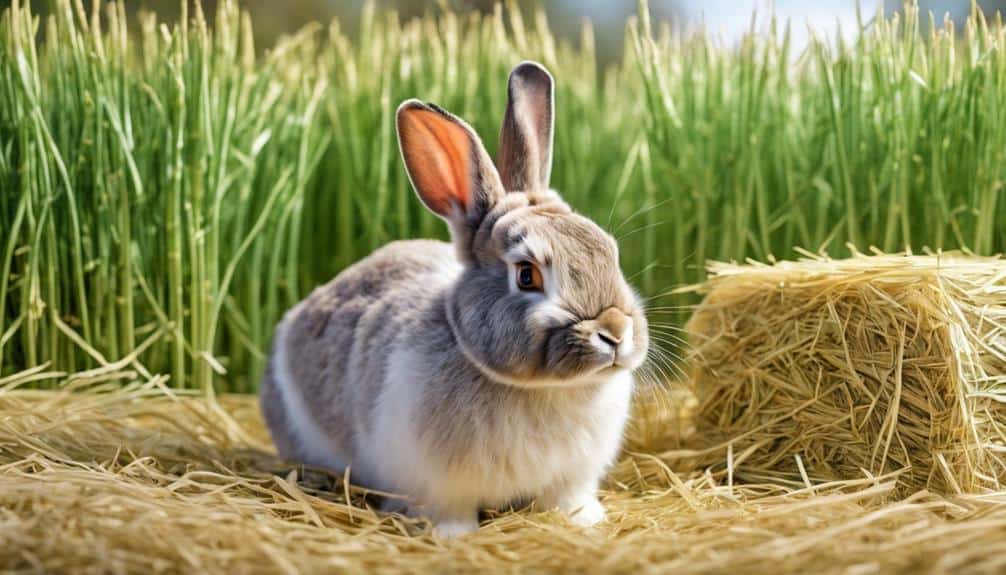
Introducing new hay varieties gradually enhances the dietary experience for rabbits, promoting both physical health and mental stimulation. When adding variety to your rabbits' diet, you not only prevent boredom but also provide them with additional nutrients for a balanced diet.
Here's how you can effectively introduce new hay varieties to your furry friends:
- Gradual Change: Start by mixing small amounts of the new hay with their current hay. Slowly increase the proportion of the new hay over a week or two to allow your rabbits to adjust comfortably.
- Monitor Reactions: Keep a close eye on how your rabbits react to the new hay varieties. Look for signs of excitement, increased eating, or any adverse effects that may indicate a dislike or intolerance.
- Encourage Variety: Offer a mix of hay types such as timothy, orchard grass, or oat hay to stimulate their senses and encourage eating. This variety not only keeps them engaged but also ensures they receive a diverse range of nutrients for the best health.
Frequently Asked Questions
Can Bunnies Survive off Only Hay?
You can sustain bunnies on just hay due to its fiber, nutrients, and dental benefits. While hay alone is sufficient, a balanced diet with pellets, veggies, and treats is best for overall bunny health.
What Is the Alternative to Hay for Rabbits?
For your bunny's health, consider a pellet diet with fresh vegetables like bell peppers and carrots. Mix in Timothy hay, alfalfa hay, or orchard grass. Explore hay cubes or other hay alternatives to provide variety and essential nutrients.
Is Hay Necessary for Rabbits?
In maintaining a rabbit's health, hay is indispensable. It aids in dental care, digestive health, and overall well-being. Ensuring nutritional balance, fiber content, and hay quality are essential for your bunny's vitality.
What Percentage of the Rabbit's Diet Should Be Hay?
For vital health, make sure 80% of your rabbit's diet consists of hay. This proportion aids in digestion, provides essential nutrients, and prevents issues like fur blockage. Hay is crucial for your bunny's well-being and overall health.
What Vegetables Should I Feed My Bunny Besides Hay for a Healthy Diet?
In addition to hay, the top vegetables for rabbit’s diet include leafy greens like kale, romaine lettuce, and spinach. Carrots, bell peppers, and broccoli are also good options. Just be sure to introduce new vegetables gradually to avoid upsetting your bunny’s delicate digestive system.
Conclusion
Vital, just as a key opens a treasure trove of health and vitality for your bunny, hay serves as the essential cornerstone of their well-being. Like a symphony conductor orchestrating a harmonious melody, hay guarantees the perfect balance of fiber, nutrients, and mental stimulation for your furry friend.
So, remember to keep the hay flowing like a gentle stream, nourishing your bunny's body and soul with every munch and crunch.

